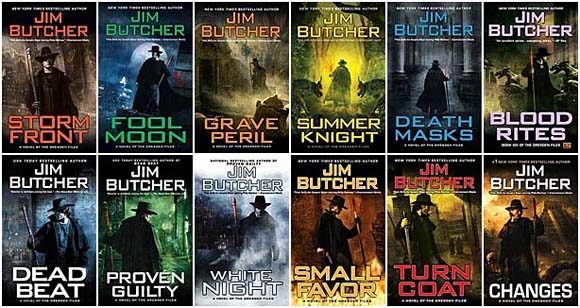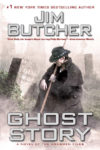Book series review: The Dresden Files (1-15) by Jim Butcher

I’ve owned the first eight Dresden Files books for a couple of years now and I kept meaning to read them and never getting around to it. I did read the first book, Storm Front, a few years ago but didn’t love it enough to continue (I didn’t dislike it either, I just kept getting distracted by other books). I also haven’t been compelled by most urban fantasy that I’ve read so I figured the genre just wasn’t for me. One of my colleagues at work is a huge fan of the series, though, and talking about it with him nudged me into finally reading those eight books on my shelf… and then buying the next seven, and the anthology of Dresden stories, and all the Dresden graphic novels.
 The Dresden Files is a series of novels featuring Harry Dresden, the only professional wizard in Chicago. He’s basically a private investigator but he can do things that ordinary people can’t do. The world of the books is superficially identical to our own, but there is a thriving community of magic users and/or non-humans under the surface (faeries, werewolves, vampires, ghouls, gods, dragons, and so on, pretty standard for its genre). Of course all the cases that Dresden gets ends up involving magic in some way, and many of them come from his work as a consultant for the Chicago police department.
The Dresden Files is a series of novels featuring Harry Dresden, the only professional wizard in Chicago. He’s basically a private investigator but he can do things that ordinary people can’t do. The world of the books is superficially identical to our own, but there is a thriving community of magic users and/or non-humans under the surface (faeries, werewolves, vampires, ghouls, gods, dragons, and so on, pretty standard for its genre). Of course all the cases that Dresden gets ends up involving magic in some way, and many of them come from his work as a consultant for the Chicago police department.
I stand by my original assessment of the first book – Storm Front is decent but it definitely feels like a debut novel. In comparison to the later books, Dresden’s character seems a little rough, like the author was trying out a couple of different personalities for him but hadn’t figured out who exactly he was yet. It’s a stereotypical pulpy police procedural – guy with special powers partnered with a spunky female cop solving a series of murders involving (among other things) gore and wild orgies. But I was prepared for that since I’d read it before and people on the internet said the series really hit its stride a couple of books in, so I kept reading.
 The second book, Fool Moon was better than the first but didn’t quite have me drawn in yet (all the different types of werewolves showing up in a single story seemed contrived, among other issues). I don’t think I was eager to read more until the end of the third book, so far the series had just seemed like a run-of-the-mill procedural, but Grave Peril didn’t have Karrin Murphy (the female cop) in it much at all, showing that it wasn’t going to keep following the same format. And the ending showed that the series wasn’t afraid to take risks and change things up. I felt like I was actually getting to know the characters and that they were realistic and would grow over the books.
The second book, Fool Moon was better than the first but didn’t quite have me drawn in yet (all the different types of werewolves showing up in a single story seemed contrived, among other issues). I don’t think I was eager to read more until the end of the third book, so far the series had just seemed like a run-of-the-mill procedural, but Grave Peril didn’t have Karrin Murphy (the female cop) in it much at all, showing that it wasn’t going to keep following the same format. And the ending showed that the series wasn’t afraid to take risks and change things up. I felt like I was actually getting to know the characters and that they were realistic and would grow over the books.
After that I was pretty much hooked. One of the things I didn’t like about previous urban fantasy that I’ve read was that they seemed to take more inspiration from mystery novels than fantasy. I love Agatha Christie, for example, but Miss Marple or Poirot don’t change very much over the course of their stories, the fun of the books is in the solving of the crime. My favorite genres are epic fantasy and science fiction and a large part of why I love them is that they build interesting worlds and have characters that often have to come of age or rise to the occasion; their emotional growth is an integral part of the story. The Dresden Files has the best of both worlds, it does have investigative elements, but Harry and all the supporting characters all change in response to the events around them and not always in good ways.
 Harry is not a perfect character, he’s got serious flaws and he’s aware of some of them. He’s not an anti-hero but he doesn’t always do the right thing (there often isn’t even a right thing) and the books don’t sugarcoat that. The people around him seem just as real, I can’t think of a single character who hasn’t made a serious mistake. Even characters that seemed stereotypical when they were first introduced (e.g. the tough female cop, the perfect Christian knight, the organized crime boss) are completely altered now.
Harry is not a perfect character, he’s got serious flaws and he’s aware of some of them. He’s not an anti-hero but he doesn’t always do the right thing (there often isn’t even a right thing) and the books don’t sugarcoat that. The people around him seem just as real, I can’t think of a single character who hasn’t made a serious mistake. Even characters that seemed stereotypical when they were first introduced (e.g. the tough female cop, the perfect Christian knight, the organized crime boss) are completely altered now.
I’ve mentioned that the series isn’t afraid to change things up, but it takes it to a (good) extreme in the twelfth book, aptly titled Changes. It turns Harry’s life upside down and the books after it breathe new life into the series while still being familiar enough to be cozy. And it’s not just the characters that change, the world gets more dangerous over the course of the books (and not just because Harry learns more and becomes a stronger wizard), it’s clearly building up to a larger conflict. This makes sense given what the author has said about the series – there are going to be around 20 standalone “single case” books and then a “big apocalyptic trilogy” at the end.
The only downside to these books is that the series is probably not going to be finished for at least a decade or more, I’m glad I got into it after 15 of the books were already out. But it’s not like there’s a shortage of books to read while waiting.

Hello Kriti! I loved your thoughts. Could I have your permission to use your review as a sample document for a college writing project?